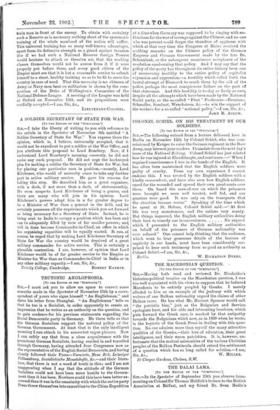A SOLDIER SECRETARY OF STATE FOR WAR. [To THE EDITOR
OP THE "SPECTATOR."] take the liberty of writing to you with reference to the article in the Spectator of November 8th entitled " A Soldier Secretary of State for War." You express there the opinion, which is, I believe, universally accepted, that it would not be expedient to put a soldier at the War Office, and you attribute this proposal to Lord Rosebery. Now, if I understand Lord Rosebery's meaning correctly, he did not make any such proposal. He did not urge the hackneyed plea for making a soldier the Secretary of State for War, but for placing one particular man in position,—namely, Lord Kitchener, who would of necessity cease to take any further part in active military service. He gave his reasons for taking this step. He described him as a great organiser, with a dash, if not more than a dash, of statesmanship. He even suspects Lord Kitchener of being a genius, and there are many who will join in his opinion. Lord Kitchener's powers adapt him in a far greater degree to be a Minister of War than a general in the field, and he certainly possesses all the requirements which you set forward as being necessary for a Secretary of State. Instead, he is being sent to India to occupy a position which has been and can be adequately filled by men of far smaller powers ; will in time become Commander-in-Chief, an office in which his organising capacities will be equally wasted. It can, of course, be urged that by making Lord Kitchener Secretary of State for War the country would be deprived of a great military commander for active service. This is certainly a plausible contention. I am, however, of opinion that Lord Kitchener would be of far greater service to the Empire as Minister for War than as Commander-in-Chief in India or in any other military capacity.—I am, Sir, &c.,










































 Previous page
Previous page